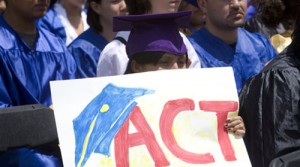Spanish Literacy Obstacle for Some Seeking Deferred Action

 By Valeria Fernandez, New America Media
By Valeria Fernandez, New America Media
PHOENIX, Ariz. – Arisbeth Meza came to Phoenix from Mexico City, following the path of her older sister. She was 13 and has been working ever since cleaning the homes of the wealthy. In Mexico, she studied until the 7th grade. She never got a chance to go to school in the United States, because she had to work to help support her family.
 Now 21, Meza’s low literacy skills in both English and Spanish stand in her way to benefiting from a federal program that offers her a reprieve from deportation.
Now 21, Meza’s low literacy skills in both English and Spanish stand in her way to benefiting from a federal program that offers her a reprieve from deportation.
To qualify for President Obama’s Deferred Action for Childhood Arrivals (DACA) program, applicants need to have been younger than age 16 when they entered the United States illegally. They must also be either a high school graduate, have a General Education Development (GED) certificate, or be enrolled in high school. They cannot have certain criminal convictions.
Those who qualify for DACA receive a two-year deferral from being deported and can contunie their work or schooling.
Came to Help Parents
For Meza, obtaining her GED certificate –even in her Spanish native tongue–is a huge challenge. She understands a little bit of English, but that is not enough for the test. When it comes to Spanish, it is difficult for her to write or make sense of punctuation. Comas and parenthesis, dashes and semicolons confuse her when she reads.
“I wanted to study when I first arrived, because I saw others doing it. But I came here hoping I could help my Mom and Dad financially,” she said in Spanish.
Meza’s situation is not unique. Advocates for “Dreamers” like her – undocumented youth who came to the country as children and who are advocating for a legal pathway to citizenship — are aware of their educational challenges.
“These are dramatic situations because these kids were not enrolled at school, perhaps out of fear that they would be singled out as undocumented immigrants,” said Carmen Cornejo, an activist from CADENA, an organization that advocates for legalization allowing Dreamers a path to citizenship. “This can also be considered a denial of their rights as children to have an education. In some instances, their family circumstances might have led them to have to work.”
Cornejo said there are opportunities for Arisbeth. Immigration authorities still consider those enrolled in GED classes for the temporary deferred action, she added.
“These kids would have a lot of problems in the long run, if they don’t enroll in a program to try to get the GED,” said Cornejo. Part of the issue is that if Congress gives support for the legalization of youth through legislation similar to the Dream Act, the threshold of education required might be much higher, she explained.
According to the Migration Policy Institute, in Washington, D.C., roughly 1.76 million youth are eligible for DACA nationally, and about 500,000 of those are younger than age 15. MPI estimates that 350,000 of all who qualify for the benefit have neither a high school diploma, nor are enrolled in school. In Arizona, an estimated 80,000 youth could benefit from DACA. There’s no data on how many of them are currently in high school or have received a diploma.
A Chance to Catch Up
In Arizona, Dreamers have faced a number of hurdles to get ahead in their education. A state law – Proposition 300 — approved by voters in 2006, bars state-funded schools from offering free GED classes to undocumented immigrants, making the path to DACA eligibility difficult for those who may have aged out of the high school system, but still wish to become eligible for the new federal program.
Proposition 300, however, doesn’t remove their right to take the GED exam altogether. Rather, advocates say, it merely bars them from taking GED classes at institutions that receive state funds.
In response, local nonprofits serving Latinos are jumping in to offer GED preparation classes for a fee. The groups are responding to a spike in demand for such services.
In October, the nonprofit Friendly House started offering GED preparation classes focused on helping DACA applicants at a fee of $300 for 10 weeks. The classes are offered in English and Spanish, and test-takers have the option of taking the GED in either language.
“We were very honest with them and told them, “This is where you’re at and this is what you need to do,” said Luis Enriquez, director of adult education and workforce development at Friendly House. “We’re not miracle workers; we’ll give you the tools. We’ll give you a good teacher. It depends on the effort you put in it.”
The program has enrolled about 100 students so far. Assessment tests showed that nearly two-thirds of them had a 6th or 7th grade literacy level in both English and Spanish.
He said it would be extremely difficult for these students to make up for six years worth of education in 10 weeks, but the program can provide clients with extra support and a plan to prepare for the GED exam.
“The problem with Spanish, is that some people speak it, but the Spanish they’re getting in the test, is academic Spanish, [with a lot] of the vocabulary they’ve never seen in social studies,” he said. “They don’t use it in everyday life,” he added.
The students that Enriquez has met are a lot like Meza. They never enrolled in school, because they had to support their family or have children of their own they have to support financially.
DACA May Offer Protection
Some of them, despite their disadvantages, were able to pass the test and are already filing for DACA, Enriquez noted. The educational program offers another advantage, he said. Immigration authorities may consider enrollment in courses to earn a GED in the DACA process.
Meza wants to get her DACA application in because she feels it will protect her, especially now that she’s pregnant and about to have her second child.
In Arizona, laws severely restricting immigrants, such as SB 1070, make it mandatory for authorities to question a person’s immigration status and turn the individual over to immigration authorities.
Financial pressures could once again set her back.
Besides the expense of a second child, Arisbeth is now sending money to her grandmother to buy medicine. So, it may take time for Meza to save up enough for GED classes and application fees to apply for the federal program.
This article was first published in New America Media.
[Photo by a caballero/New America Media]
